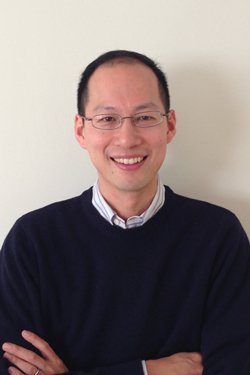Christopher Chang
2015 National Award Winner — Faculty

Current Position:
Class of 1942 Chair Professor of Chemistry and Professor of Molecular and Cell Biology; HHMI Investigator
Institution:
University of California, Berkeley
Discipline:
Inorganic & Solid-State Chemistry
Recognized for: His work at the frontiers of metallo-neurochemistry and sustainable energy research
Areas of Research Interest and Expertise: Metals in biology, neuroscience, molecular imaging, sustainable energy, catalysis
Biography:
PhD, Massachusetts Institute of Technology
BS / MS, California Institute of Technology
Christopher Chang’s research focuses on the study of metals for biological and energy applications, with particular interest in neuroscience and solar-to-chemical conversion. His group has developed molecular imaging tools to enable identification of copper as a new element for modulating neural circuitry as well as an essential role for hydrogen peroxide to promote proper neural stem cell growth and neurogenesis.
The discovery of copper as a bonafide cell signal offers a new paradigm for metals in biology, expanding the roles of redox transition metals beyond metabolism. His group's leading work in catalysis has shown that simple molecular mimics of complex enzymes and materials can be used to create new classes of catalysts for solar energy conversion that feature cheap, earth-abundant elements and operate under environmentally friendly conditions. Dr. Chang is now pushing the boundaries of catalysis through an approach he terms "materials biology", integrating biocompatible nanomaterials and living cells to perform the sustainable solar synthesis of fuels, materials, and pharmaceuticals.
“As an inorganic chemist, I believe that the periodic table represents a chemical roadmap, a blueprint for the elements of life and the environment around us. We seek to use that roadmap to help image and understand new roles for elements in biology, particularly in the brain, and use and push our fundamental understanding of the elements to develop chemistry of societal benefit, such as technologies for sustainable energy.”
Key Publications:
- Dickinson, B. C., Peltier, J., Stone, D., Schaffer, D. V., Chang, C. J. Nox2 redox signaling maintains essential cell populations in the brain. Nat. Chem. Biol. 2011
- Karunadasa, H. I.; Montalvo, E.; Sun, Y.; Majda, M.; Long, J. R.; Chang, C. J. A Molecular MoS2 Edge Site Mimic for Catalytic Hydrogen Generation. Science. 2012
- Dodani, S. C.; Firl, A.; Chan, J.; Nam, C. I.; Aron, A. T.; Onak, C. S.; Ramos-Torres, K. M.; Paek, J.; Webster, C. W.; Feller, M. B.; Chang, C. J. Copper is an endogenous modulator of neural circuit spontaneous activity. Proc. Natl. Acad. Sci. USA 2014
Other Honors:
| 2004 | Dreyfus New Faculty Award |
| 2005 | Beckman Young Investigator Award |
| 2005 | American Federation for Aging Research Award |
| 2006 | NSF CAREER Award |
| 2006 | Packard Fellowship |
| 2007 | Sloan Fellowship |
| 2008 | Saltman Award, Metals in Biology GRC |
| 2008 | Amgen Young Investigator Award |
| 2008 | Bau Award in Inorganic Chemistry |
| 2008 | Technology Review TR35 Young Innovator Award |
| 2008 | Howard Hughes Medical Institute Investigator |
| 2009 | Astra Zeneca Excellence in Chemistry Award |
| 2009 | Novartis Early Career Award |
| 2010 | ACS Cope Scholar Award |
| 2011 | SBIC Early Career Award |
| 2011 | Wilson Prize, Harvard University |
| 2012 | ACS Eli Lilly Award in Biological Chemistry |
| 2012 | RSC Award in Transition Metal Chemistry |
| 2013 | ACS Nobel Laureate Signature Award in Graduate Education |
| 2013 | Baekeland Award, ACS New Jersey Section |
In the Media:
Interest in complexity drives winning scientist. ChinaDaily USA. July 6, 2015
University of California professors sweep young scientist awards. June 30, 2015
Artificial Photosynthesis Advance Hailed As Major Breakthrough. Huffington Post. April 20, 2015
Copper on the Brain at Rest. Berkeley Lab. November 26, 2014
Of Metal Heads and Imaging. Berkeley Lab. August 15, 2014
Innovators Under 35. MIT Tech Review. 2013
Breakthrough in designing cheaper, more efficient catalysts for fuel cells. UC Berkeley News Center. February 9, 2012As engineers of the molecular world, chemists are making their mark in biology. HHMI Bulletin . November 2011
THE CHANG GROUP
